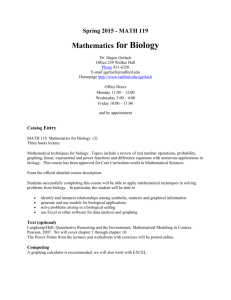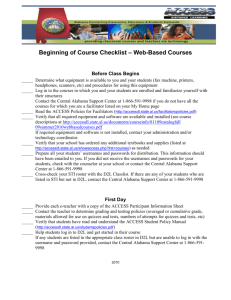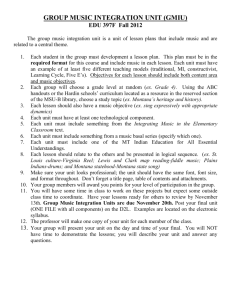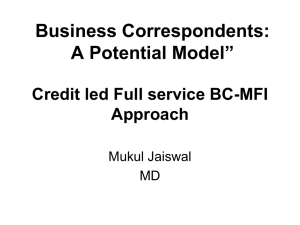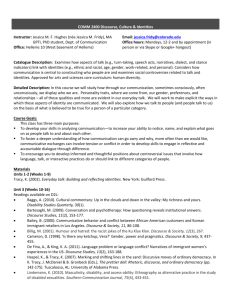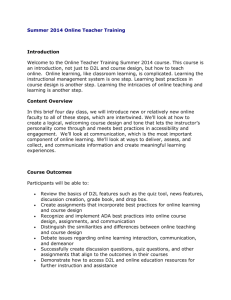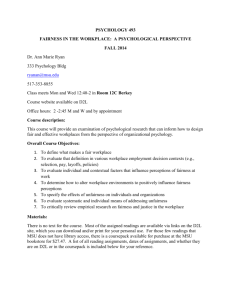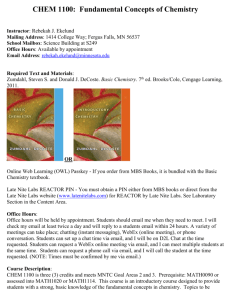COMM 4057: COMMUNICATION AND ORGANIZATIONAL
advertisement
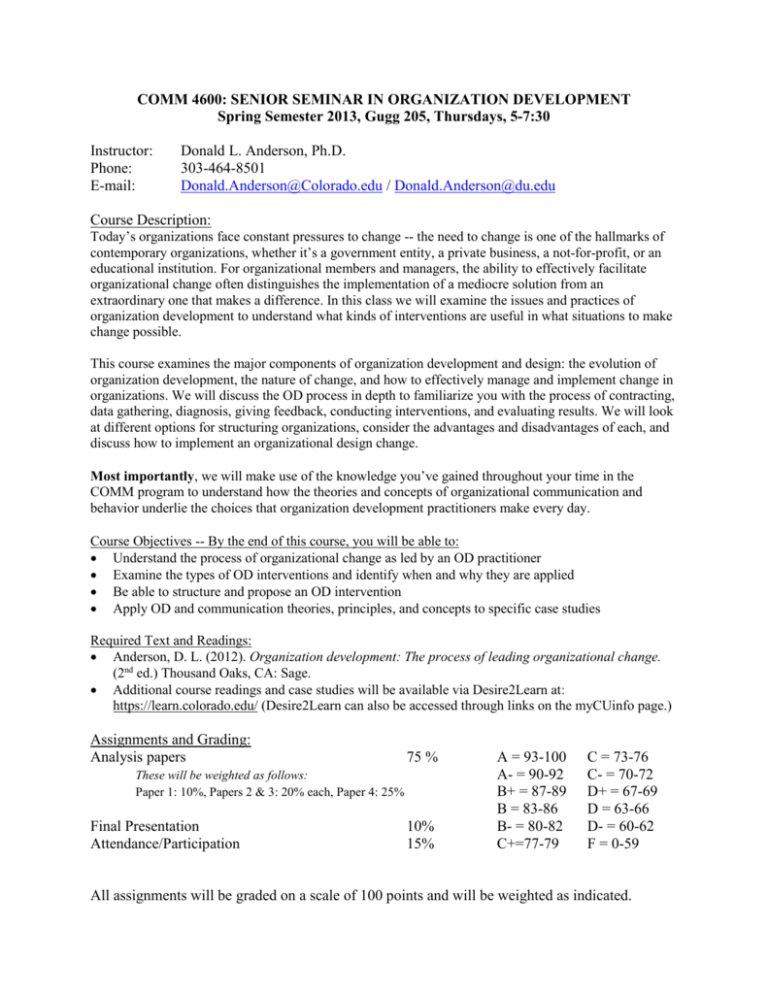
COMM 4600: SENIOR SEMINAR IN ORGANIZATION DEVELOPMENT Spring Semester 2013, Gugg 205, Thursdays, 5-7:30 Instructor: Phone: E-mail: Donald L. Anderson, Ph.D. 303-464-8501 Donald.Anderson@Colorado.edu / Donald.Anderson@du.edu Course Description: Today’s organizations face constant pressures to change -- the need to change is one of the hallmarks of contemporary organizations, whether it’s a government entity, a private business, a not-for-profit, or an educational institution. For organizational members and managers, the ability to effectively facilitate organizational change often distinguishes the implementation of a mediocre solution from an extraordinary one that makes a difference. In this class we will examine the issues and practices of organization development to understand what kinds of interventions are useful in what situations to make change possible. This course examines the major components of organization development and design: the evolution of organization development, the nature of change, and how to effectively manage and implement change in organizations. We will discuss the OD process in depth to familiarize you with the process of contracting, data gathering, diagnosis, giving feedback, conducting interventions, and evaluating results. We will look at different options for structuring organizations, consider the advantages and disadvantages of each, and discuss how to implement an organizational design change. Most importantly, we will make use of the knowledge you’ve gained throughout your time in the COMM program to understand how the theories and concepts of organizational communication and behavior underlie the choices that organization development practitioners make every day. Course Objectives -- By the end of this course, you will be able to: Understand the process of organizational change as led by an OD practitioner Examine the types of OD interventions and identify when and why they are applied Be able to structure and propose an OD intervention Apply OD and communication theories, principles, and concepts to specific case studies Required Text and Readings: Anderson, D. L. (2012). Organization development: The process of leading organizational change. (2nd ed.) Thousand Oaks, CA: Sage. Additional course readings and case studies will be available via Desire2Learn at: https://learn.colorado.edu/ (Desire2Learn can also be accessed through links on the myCUinfo page.) Assignments and Grading: Analysis papers 75 % These will be weighted as follows: Paper 1: 10%, Papers 2 & 3: 20% each, Paper 4: 25% Final Presentation Attendance/Participation 10% 15% A = 93-100 A- = 90-92 B+ = 87-89 B = 83-86 B- = 80-82 C+=77-79 C = 73-76 C- = 70-72 D+ = 67-69 D = 63-66 D- = 60-62 F = 0-59 All assignments will be graded on a scale of 100 points and will be weighted as indicated. 2 Writing Assignments Writing assignments are listed in the syllabus. You will be asked to respond to the case study readings through evaluation and application of specific OD concepts. All papers should be typed and doublespaced. Assignments will be marked down 3 points for each day late. (Late papers should be submitted by e-mail.) I expect that all writing assignments will demonstrate your most professional work, including thorough and well-thought out arguments and discussions, appropriate citations where necessary, clear organization in order to communicate unambiguously to the reader, and the absence of mechanical flaws (such as grammar and spelling errors). The best case study applications will involve an explanation of the concepts from the week and will use specific examples and quotes from both the case study and the reading assignment to demonstrate appropriate application of the material. Applying course concepts to case studies requires particular attention to the logical flow of your writing. Be sure to do 3 things whenever you discuss how a concept applies to situations in the cases: (1) identify and explain the concept to someone not familiar with the course, (2) explain the situation you’re referring to, using specific quotes and examples, and (3) be very explicit about how (1) relates to (2); that is, what is it that this concept tells us about this case situation (and vice versa)? Grading: Papers will be graded using the following grading criteria/rubric. 1. Concepts and ideas Use of course concepts and readings Explanation of course ideas 2. Organization and expression Clarity of expression of ideas Organization and logical flow Use of data from the case 3. Mechanics and presentation Professional presentation, including writing style, grammar, spelling, appropriate reference format 50% 40% 10% Attendance/Participation Your participation will be counted at 15% of the final grade. Participation means having read the material and discussion questions (when posted in the syllabus) and contributing to our collective understanding of the material by asking questions, making relevant comments, and bringing examples to the class from current events or personal experience. Incomplete Grades Incomplete grades are only granted under exceptional circumstances. If you find that circumstances prevent you from completing the course, please discuss this with me prior to the final class period. Classroom Behavior Policy: Students and faculty each have responsibility for maintaining an appropriate learning environment. Students who fail to adhere to such behavioral standards may be subject to discipline. Faculty has the professional responsibility to treat all students with understanding, dignity and respect, to guide classroom discussion and to set reasonable limits on the manner in which they and their students express opinions. Professional courtesy and sensitivity are especially important with respect to individuals and topics dealing with differences of race, culture, religion, politics, sexual orientation, gender variance, and nationalities. 3 Disabilities: If you qualify for accommodations because of a disability, please submit to me a letter from Disability Services in a timely manner so that your needs may be addressed. Disability Services determines accommodations based on documented disabilities (303-492-8671, N200 Center for Community, http://www.colorado.edu/disabilityservices). Honor Code: All students of the University of Colorado at Boulder are responsible for knowing and adhering to the academic integrity policy of this institution. Violations of this policy may include: cheating, plagiarism, aid of academic dishonesty, fabrication, lying, bribery, and threatening behavior. All incidents of academic misconduct shall be reported to the Honor Code Council (honor@colorado.edu 303-725-2273). Students who are found to be in violation of the academic integrity policy will be subject to both academic sanctions from the faculty member and non-academic sanctions (including but not limited to university probation, suspension, or expulsion). Other information on the Honor Code can be found at http://www.colorado.edu/policies/student-honor-code-policy. Observance of Religious Holidays and Absences from Classes or Examinations: Campus policy regarding religious observances requires that faculty make every effort to reasonably and fairly deal with all students who, because of religious obligations, have conflicts with scheduled examinations, assignments, or required attendance. In this class, I will make every effort to accommodate all students who have such conflicts with scheduled examinations, assignments, or attending class, provided students notify me well in advance of the scheduled conflict. Sexual Harassment: The University of Colorado Policy on Sexual Harassment applies to all students, staff, and faculty. Sexual harassment is unwelcome sexual attention. It can involve intimidation, threats, coercion, or promises to create an environment that is hostile or offensive. Harassment may occur between members of the same or opposite gender and between any combinations of members in the campus community: students, faculty, staff, and administrators. Harassment can occur anywhere on campus, including the classroom, the workplace, or a residence hall. Any student, staff, or faculty member who believes s/he has been sexually harassed should contact the Office of Discrimination and Harassment (ODH) at 303-492-2127 or the Office of Judicial Affairs at 303-492-5550. Information about the ODH and the campus resources available to assist individuals who believe they have been sexually harassed can be obtained at: http://hr.colorado.edu/dh/Pages/default.aspx. 4 Class Schedule & Writing Assignments Date Topics/Reading Week 1 1/17/13 Introduction to course, Defining organization development, OD history and foundational concepts Week 2 1/24/13 OD values and foundations of organizational change Assignment DUE in class on this date Read Organization Development;( hereafter OD), chapters 1 & 2 Week 3 1/31/13 Visit Desire2Learn to download this week’s case study (“Brother John”). Please bring a copy to class. Foundations of organizational change (continued) Read OD, chapter 3-4 Articles on Desire2Learn: Dialogic OD Visit Desire2Learn to download the case study for this week’s paper (“Sticker Shock”) Week 4 2/7/13 The OD consultant and consulting process, Entry and contracting Case study analysis paper due Answer the following questions about the case study in a ~5 page paper: 1. What is going on at Helping Hands? What is the problem? 2. What is your impression of Judy as a leader? Use one or more of the management concepts in chapter 2 to explain Judy’s style of management. Give evidence from the case for your view. 3. What opportunities for organization development work do you see at Helping Hands? Refer to the Values of OD in chapter 3 – how would your opportunities for OD work be modeling those values? Which values guide your thoughts about how to take action at Helping Hands? What I’m looking for in this paper: A good understanding of what OD is and what it can offer to a client. Exploration of OD values and how those values direct certain choices on behalf of practitioners. Check the web for the site of an organization development consultant(s), and bring the site to class. Read OD, chapter 5 D2L: “Contracting for Success” Week 5 2/14/13 Data Gathering Read OD, chapters 6-7 D2L: “Dixie Weaving” Week 6 2/21/13 Data Analysis and Diagnosis Read OD, chapter 8 Read AeroTech case study, p. 145 in OD Case study analysis paper due Read the AeroTech case study in OD and address the following questions in a ~5 page data gathering plan: What are the presenting problems in this organization? What do you think may be any underlying problems? Which of these underlying problems is most likely, in your view? What data would illustrate whether these underlying problems are occurring? Which method of data gathering would you use and 5 why? (Consider using the method of analysis shown in Figure 7.2). What are the advantages and disadvantages of that method of data gathering? Include a proposed timeline for your approach and any details about the data gathering method itself, including possible interview and/or survey questions, documents to gather, and/or observations you would conduct. What I’m looking for in this paper: Logical link between what the client says, what underlying issues may be present, and the data gathering approach using what you learn from the text and what you recall from social science research courses!. Appropriate choice of data gathering approach given the underlying issues. Week 7 2/28/13 Data Analysis and Diagnosis (continued) D2L: “The Process of Diagnosis” and “Diagnostic vs. Dialogic OD” D2L: “The Metric Division” D2L: “Preparing for Feedback” Week 8 3/7/13 Feedback, Resistance, introduction to interventions Week 9 3/14/13 Read OD, chapter 9 D2L: “Understanding Resistance” Whole organization interventions Discussion question to consider as you read: What is the difference between “Diagnostic OD” and “Dialogic OD”? How might this difference play out in your analysis of the “Metric Division” case data? Read OD, chapter 12 and case study “Crossroads Center” D2L: “Diggins/Reinholdt Plastics” Week 10 3/21/13 Whole organization interventions: Organization Design D2L: Galbraith reading D2L: Case study TBD Spring Break! 3/28/13 Week 11 4/4/13 Team interventions Read OD, chapter 11 “DocSystems Billing” case study D2L: “When a Team Breaks in Two” Case study analysis paper due Read the “DocSystems” case in OD and answer the following questions using course concepts in a ~5 page paper. What problems exist in this organization? How do these problems differ based on the employees’ roles? Make a recommendation to the client about what could be done next based on the data included. Summarize your observations for 6 the client, offer possible interpretations, and suggest an approach for next steps. (What intervention(s) would you suggest? What would be the intervention strategy and purpose?) Connect your ideas with some of the concepts in the text. What I’m looking for in this paper: Clarity of presentation, useful categorization that summarizes the top issues, prioritization of issues, rationale for choice of main issue(s). Sorting through the many issues to focus on the most central. Write in a way that motivates the client to take action, and directs action to the central issues. You should cite the team interventions we’ve discussed from the text. Week 12 4/11/13 Week 13 4/18/13 Week 14 4/25/13 Week 15 5/2/13 Team interventions (cont); Individual interventions Read OD, chapter 10 Read OD: Case Study 4 (p. 213; “Parks Department”) D2L: “Greencycle Publishing” Individual interventions (cont) and Evaluation Read OD, chapter 13 D2L: “The Case of Jim” D2L: Coaching instruments Global Issues in OD Read OD, chapter 14 D2L: “Global Chain of Command” Final Presentations; The Future of OD Before class, complete “Coaching Instrument #1” and “Coaching Instrument #2” (both available on D2L). Please bring copies of your completed instruments to class. Note: You may make up answers as you wish, or you may complete it honestly Final Presentations Your final presentations will be held in class on this date. “ASP Software” case in OD Final Exam By the final exam deadline, submit your final paper to me by e-mail. Your presentation should be accompanied by a PowerPoint presentation and will be supported by the written paper that you submit no later than the final exam date. More information will be provided in class. Case study analysis paper due. This paper should make use of all that you’ve learned throughout the course, and should be 8-10 pages. Read the “ASP Software” reorganization case study and prepare a proposal/paper in the form of a letter addressed to the client. You should be specific in your paper with what you would intend to do next, providing evidence of the problems or opportunities for organization development work you see (use examples) and then propose an intervention to satisfy Susan’s request. Be specific with what your intervention will accomplish, what you expect from the sponsor and participants, and what your role will be. Include an outline of the intervention(s) (timeline or agenda). (Ensure that you explain your proposal in the language and supported by theories and concepts we’ve discussed in class.)

